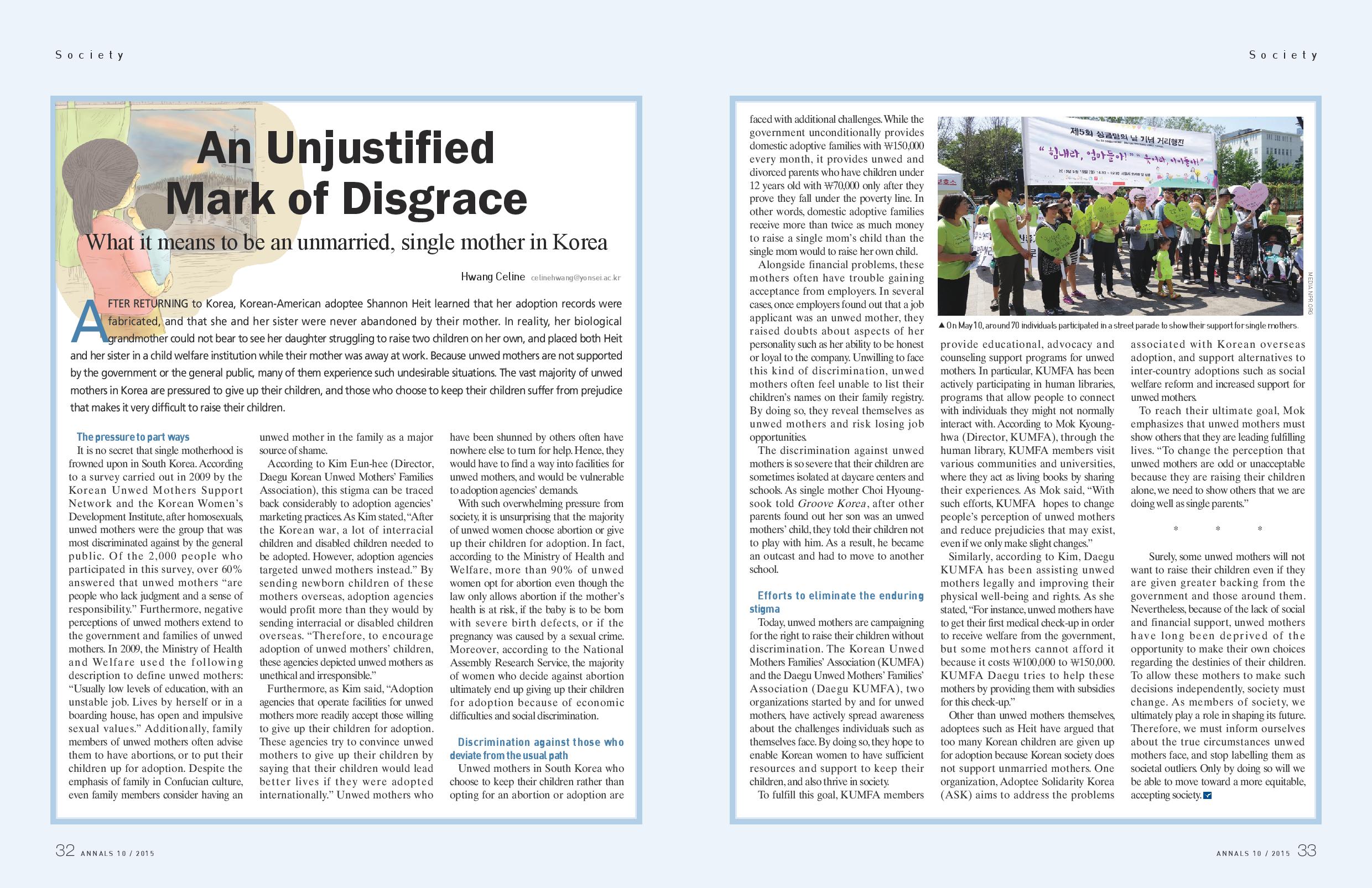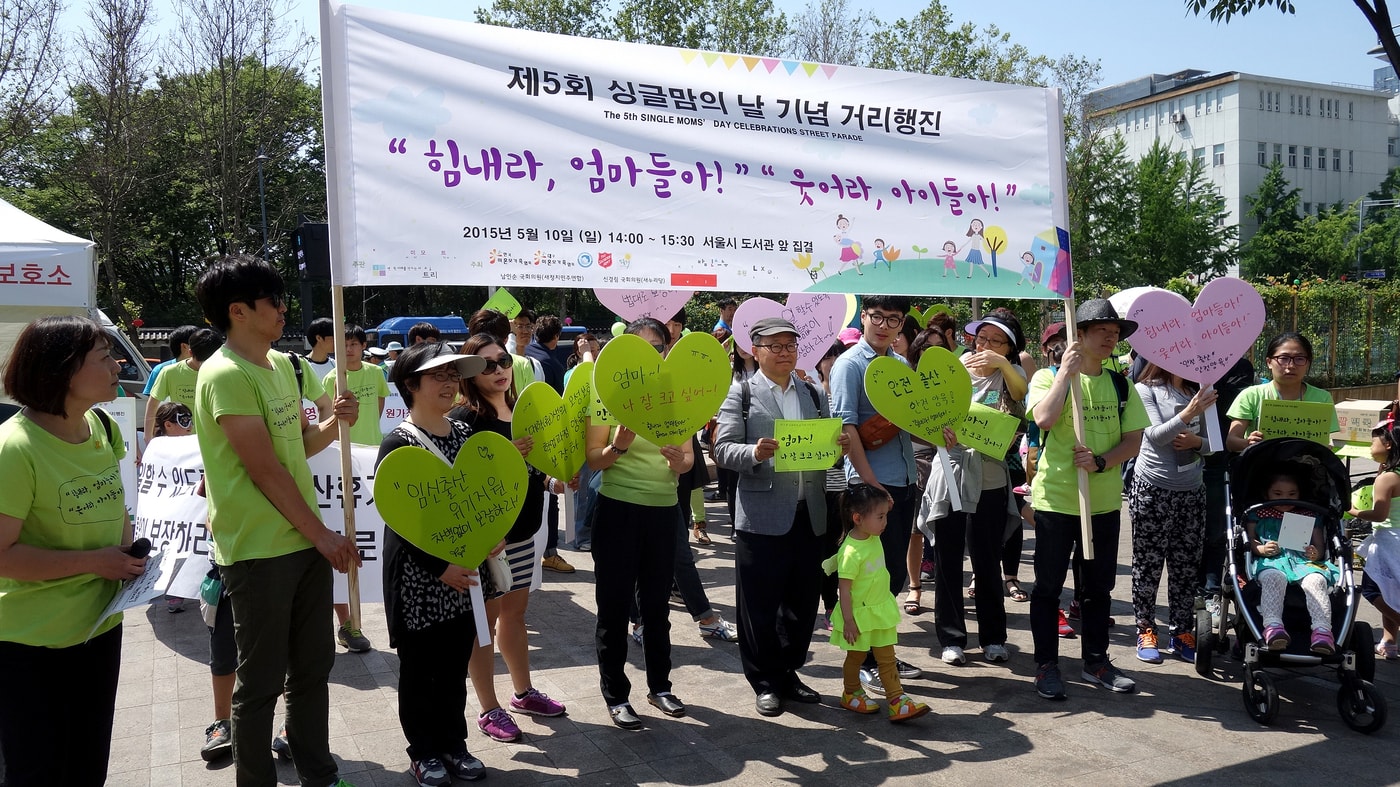What it means to be an unmarried, single mother in Korea


AFTER RETURNING to Korea, Korean-American adoptee Shannon Heit learned that her adoption records were fabricated, and that she and her sister were never abandoned by their mother. In reality, her biological grandmother could not bear to see her daughter struggling to raise two children on her own, and placed both Heit and her sister in a child welfare institution while their mother was away at work. Because unwed mothers are not supported by the government or the general public, many of them experience such undesirable situations. The vast majority of unwed mothers in Korea are pressured to give up their children, and those who choose to keep their children suffer from prejudice that makes it very difficult to raise their children.
The pressure to part ways
It is no secret that single motherhood is frowned upon in South Korea. According to a survey carried out in 2009 by the Korean Unwed Mothers Support Network and the Korean Women’s Development Institute, after homosexuals, unwed mothers were the group that was most discriminated against by the general public. Of the 2,000 people who participated in this survey, over 60% answered that unwed mothers “are people who lack judgment and a sense of responsibility.” Furthermore, negative perceptions of unwed mothers extend to the government and families of unwed mothers. In 2009, the Ministry of Health and Welfare used the following description to define unwed mothers: “Usually low levels of education, with an unstable job. Lives by herself or in a boarding house, has open and impulsive sexual values.” Additionally, family members of unwed mothers often advise them to have abortions, or to put their children up for adoption. Despite the emphasis of family in Confucian culture, even family members consider having an unwed mother in the family as a major source of shame.
According to Kim Eun-hee (Director, Daegu Korean Unwed Mothers’ Families Association), this stigma can be traced back considerably to adoption agencies’ marketing practices. As Kim stated, “After the Korean war, a lot of interracial children and disabled children needed to be adopted. However, adoption agencies targeted unwed mothers instead.” By sending newborn children of these mothers overseas, adoption agencies would profit more than they would by sending interracial or disabled children overseas. “Therefore, to encourage adoption of unwed mothers’ children, these agencies depicted unwed mothers as unethical and irresponsible.”
Furthermore, as Kim said, “Adoption agencies that operate facilities for unwed mothers more readily accept those willing to give up their children for adoption. These agencies try to convince unwed mothers to give up their children by saying that their children would lead better lives if they were adopted internationally.” Unwed mothers who have been shunned by others oftenhave nowhere else to turn for help. Hence, they would have to find a way into facilities for unwed mothers, and would be vulnerable to adoption agencies’ demands.
With such overwhelming pressure from society, it is unsurprising that the majority of unwed women choose abortion or give up their children for adoption. In fact, according to the Ministry of Health and Welfare, more than 90% of unwed women opt for abortion even though the law only allows abortion if the mother’s health is at risk, if the baby is to be born with severe birth defects, or if the pregnancy was caused by a sexual crime. Moreover, according to the National Assembly Research Service, the majority of women who decide against abortion ultimately end up giving up their children for adoption because of economic difficulties and social discrimination.
Discrimination against those who deviate from the usual path
Unwed mothers in South Korea who choose to keep their children rather than opting for an abortion or adoption are faced with additional challenges. While the government unconditionally provides domestic adoptive families with 150,000 every month, it provides unwed and divorced parents who have children under 12 years old with 70,000 only after they prove they fall under the poverty line. In other words, domestic adoptive families receive more than twice as much money to raise a single mom’s child than the single mom would to raise her own child.
Alongside financial problems, these mothers often have trouble gaining acceptance from employers. In several cases, once employers found out that a job applicant was an unwed mother, they raised doubts about aspects of her personality such as her ability to be honest or loyal to the company. Unwilling to face this kind of discrimination, unwed mothers often feel unable to list their children’s names on their family registry. By doing so, they reveal themselves as unwed mothers and risk losing job opportunities.
The discrimination against unwed mothers is so severe that their children are sometimes isolated at daycare centers and schools. As single mother Choi Hyoung-sook told Groove Korea, after other parents found out her son was an unwed mothers’ child, they told their children not to play with him. As a result, he became an outcast and had to move to another school.
Efforts to eliminate the enduring stigma
Today, unwed mothers are campaigning for the right to raise their children without discrimination. The Korean Unwed Mothers Families’ Association (KUMFA) and the Daegu Unwed Mothers’ Families’ Association (Daegu KUMFA), two organizations started by and for unwed mothers, have actively spread awareness about the challenges individuals such as themselves face. By doing so, they hope to enable Korean women to have sufficient resources and support to keep their children, and also thrive in society.
To fulfill this goal, KUMFA members provide educational, advocacy and counseling support programs for unwed mothers. In particular, KUMFA has been actively participating in human libraries, programs that allow people to connect with individuals they might not normally interact with. According to Mok Kyoung-hwa (Director, KUMFA), through the human library, KUMFA members visit various communities and universities, where they act as living books by sharing their experiences. As Mok said, “With such efforts, KUMFA hopes to change people’s perception of unwed mothers and reduce prejudicies that may exist, even if we only make slight changes.”
Similarly, according to Kim, Daegu KUMFA has been assisting unwed mothers legally and improving their physical well-being and rights. As she stated, “For instance, unwed mothers have to get their first medical check-up in order to receive welfare from the government, but some mothers cannot afford it because it costs 100,000 to 150,000. KUMFA Daegu tries to help these mothers by providing them with subsidies for this check-up.”
Other than unwed mothers themselves, adoptees such as Heit have argued that too many Korean children are given up for adoption because Korean society does not support unmarried mothers. One organization, Adoptee Solidarity Korea (ASK) aims to address the problems associated with Korean overseas adoption, and support alternatives to inter-country adoptions such as social welfare reform and increased support for unwed mothers.
To reach their ultimate goal, Mok emphasizes that unwed mothers must show others that they are leading fulfilling lives. “To change the perception that unwed mothers are odd or unacceptable because they are raising their children alone, we need to show others that we are doing well as single parents.”
* * *
Surely, some unwed mothers will not want to raise their children even if they are given greater backing from the government and those around them. Nevertheless, because of the lack of social and financial support, unwed mothers have long been deprived of the opportunity to make their own choices regarding the destinies of their children. To allow these mothers to make such decisions independently, society must change. As members of society, we ultimately play a role in shaping its future. Therefore, we must inform ourselves about the true circumstances unwed mothers face, and stop labelling them as societal outliers. Only by doing so will we be able to move toward a more equitable, accepting society.
Hwang Celine
celinehwang@yonsei.ac.kr

